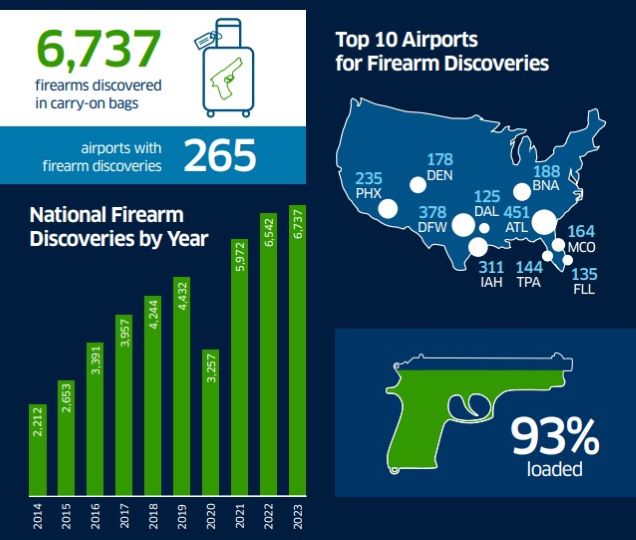HAVE GUN WIILL TRAVEL: US intercepts record number of firearms at airports in 2023
US Security officials intercepted a record number of firearms – nearly all of them (93%) loaded – at US airports in 2023, says the Transportation Security Administration (TSA). The total of 6,737 firearms at airport security checkpoints, surpassed the previous record of 6,542 firearms in 2022, and the highest one-year total in TSA’s history. The worst offender was Atlanta, followed by Dallas and Houston.
TSA notes that its efforts prevented the guns getting into the secure areas of the airport and onboard aircraft.
In the fourth quarter of 2023, which ended Dec. 31, Transportation Security Officers (TSOs) stopped 1,665 firearms at checkpoints. The total represents an average of 18 firearms per day at TSA checkpoints.
A small consolation is that TSA screened more than 858 million individuals, which indicates the agency intercepted 7.8 firearms per million passengers, a drop from 8.6 per million passengers in 2022.
Nevertheless, TSA Administrator David Pekoske said, “We are still seeing far too many firearms at TSA checkpoints, and what’s particularly concerning is the amount of them loaded, presenting an unnecessary risk to everyone at the TSA checkpoint.”
In the US, firearms and ammunition are strictly prohibited in carry-on baggage. Passengers are only allowed to travel with an unloaded firearm, and only if they pack it properly in a locked, hard-sided case in their checked baggage and first declare it to the airline at the check-in counter.
When a firearm is detected at a security checkpoint, TSOs immediately contact local law enforcement, who remove the passenger and the firearm from the checkpoint area. Depending on local laws, the law enforcement officer may arrest or cite the passenger. TSA does not confiscate firearms.
In addition to any action taken by law enforcement, TSA fines passengers who bring a firearm to a TSA checkpoint with a civil penalty up to approximately $15,000, revokes TSA PreCheck eligibility for at least five years and may conduct enhanced screening to ensure there are no other threats present.

First published at Travel Industry Today





